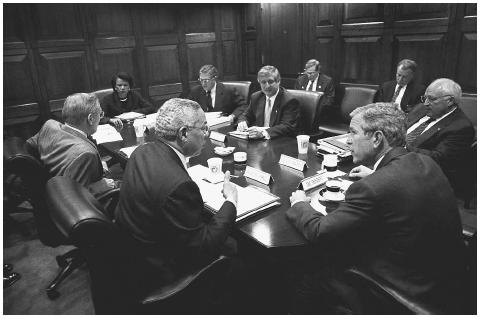Bush Administration (2001–), United States National Security Policy
█ CARYN E. NEUMANN
George W. Bush, transformed the national security system of the United States to combat the threat of global terrorism. After the terrorist attacks of September 11, 2001, Bush faced the likelihood of a repeat attack with the knowledge that terrorism could not be effectively addressed through traditional defensive strategies. Accordingly, the administration developed a homeland security

system and advanced a new doctrine that took into account the shadowy nature of terrorism. With this theory of pre-emption, Bush argued that the U.S. possessed the right and the moral responsibility to launch preventive strikes against states that posed a danger to national security even when that danger was not imminent. This doctrine led to the U.S. led attack upon Iraq, Operation Iraqi Freedom, in 2003.
Bush, a past governor of Texas, took office with little experience in foreign affairs. Nine months into his presidency, the terrorist attacks of September 11, 2001, revealed shortcomings in national security. Simply, the major institutions of American national security were designed during the Cold War to meet the requirements of that era and failed to adequately protect the U.S. from the twenty-first century threat of global terrorism. To meet the challenge of retooling the security system, Bush relied upon Donald Rumsfeld as Secretary of Defense, Colin Powell as Secretary of State, and Condoleezza Rice as National Security Advisor.
In order to address terrorism, the Bush administration changed the way that security threats were identified and monitored. Designed with the aim of collecting information about the massive and immobile Soviet bloc, the intelligence community now had to follow a far more complex and elusive set of targets. The administration strengthened intelligence warning and analysis to provide integrated threat assessments for national and homeland security. Through such new creations as the Terrorist Threat Integration Center and the use of such older networks as Interpol, the U.S. disrupted terrorist networks, removed key leaders, and arrested more than 3,000 terrorists around the world. The new Department of Homeland Security intensified security at borders and ports of entry through measures that included posting more than 50,000 federal screeners in airports.
Afghanistan had provided a safe base for al-Qaeda terrorists to plot against the U.S. and this country became the first target of an anti-terrorism strike. The 2001 war in Afghanistan aimed to capture al-Qaeda leader Osama bin Laden, remove a government that had permitted the growth of terrorism, and establish a democratic system. While the government quickly collapsed and the terrorist support network appears to be shattered, bin Laden, as of June, 2003, has not been captured. Significant numbers of U.S. military forces remain in the country to continue the search for terrorists and to serve as peacekeepers.
In the months after the Afghanistan attack, the Bush administration honed a doctrine of pre-emption that justified military aggression as the prevention of evildoing. Bush sought to persuade other nations to adopt this doctrine as part of an effort to protect the U.S. and its allies from attack by strengthening alliances to defeat global terrorism. The refusal of many other countries to cooperate for reasons that included nationalism and anger at perceived American arrogance has meant that some of these alliances have not formed. The 2003 war upon Iraq became an Anglo-American project to prevent Saddam Hussein from employing weapons of mass destruction and supporting terrorism.
Under Bush, the United States possesses the strongest military that the world has ever known. The global arms race is over, with no nation able to match the U.S. in naval, air, missile, or tank strength and only China offering a larger ground force. The ability of a large military to ensure national security, however, is not certain. The historic hostility of Arabs to Western intervention may complicate efforts to stabilize the Middle East and establish a model of democracy in Iraq and Afghanistan. With the perspective of history, therefore, the accomplishments of the Bush administration can be fully evaluated.
█ FURTHER READING:
ELECTRONIC:
White House. "National Security." < http://www.whitehouse.gov/response/index.html > (April 27, 2003).
SEE ALSO
Domestic Intelligence
Enduring Freedom, Operation
Homeland Security, United States Department
Interpol (International Criminal Police Organization)
Iraq War: Prelude to War (The International Debate Over the Use and
Effectiveness of Weapons Inspections.)
Iraqi Freedom, Operation (2003 War Against Iraq)
Terrorist Threat Integration Center
United States, Counter-terrorism Policy
World Trade Center, 2001 Terrorist Attack
Comment about this article, ask questions, or add new information about this topic: